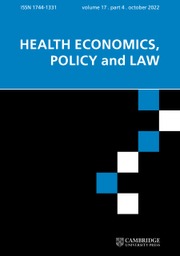Article contents
Who knows best? Older people’s and practitioner contributions to understanding and preventing avoidable hospital admissions
Published online by Cambridge University Press: 27 February 2019
Abstract
Whenever there are well-publicised pressures on acute care, there is a tendency for policy makers and the media to imply that a significant number of older people may be taking up hospital beds when they do not really need the services provided there. However, evidence to back up such claims is often lacking, and existing research tends to fail to engage meaningfully with older people themselves. In contrast, this research explores the emergency hospital admissions of older people in three English case study sites, drawing on the lived experience of older people and the practice wisdom of front-line staff to explore the appropriateness of each admission and scope for alternatives to hospital. Contrary to popular opinion, the study did not find evidence of large numbers of older people being admitted to hospital inappropriately. Indeed, some of the older people concerned delayed seeking help and only ended up at hospital as a very last resort, possibly due to concerns about being seen as a burden on scarce public resources. While older people and front-line staff identified a number of suggestions to improve services in future, there seemed few clear cut, easy answers to the longstanding dilemma of how best to reduce emergency admissions. Seeking to understand and potentially reduce emergency hospital admissions is complex, and it is important to consider the experiences and expertise of older people and front-line staff.
- Type
- Articles
- Information
- Copyright
- © Cambridge University Press 2019
References
- 4
- Cited by


